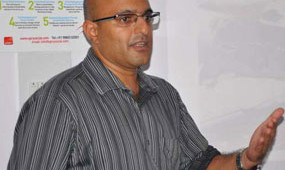By Sri Sri Ravi Shankar
Every parent wants their children to grow up to be well-educated human beings with certain values in their lives. They want to see them happy. But somewhere along the line, the link to happiness appears to be getting severed. We are losing the goal of happiness. These days, parents take more stress than their children every time their wards face a test! Even before the offspring can start thinking, the parents decide what he or she should study and what he or she should become. I have even heard stories of parents introducing their toddlers as engineers and doctors! This kind of attitude of parents can put unnecessary pressures on children and stifle their natural development.
Look at a child, a baby, what a beautiful smile it has. But see the face of the same child by the time he passes out of school and college. Does it still retain that joy, that innocence, that beauty that it was endowed with as an infant? A recent survey reveals that a baby smiles 400 times a day and adolescent smiles only 17 times a day. But an adult does not smile at all.
What is it that takes away this natural gift of humanity — smile, friendliness, compassion, broad-mindedness, scientific temper? If you ask a kid how many friends he or she has in the class, he or she will count on the fingers. Three, four or five in a classroom of 40-50 students! The kids are unable to be friendly with all the 40-50 of their class. Then how do you expect them to be friendly with the world when they come out of school.
We have somehow failed to nurture the basic human values. The basic tendency to make friends has been lost somewhere in the pursuit of selfish education. As parents, one should encourage their children to make one new friend a day.
We need to realise that our children can be creative and productive without losing the humanness that they are all born with. Just material things or comfort alone do not really make a person comfortable. What is worth having on this planet is an intelligence that is complementary with innocence. Only an education that can nourish inbuilt virtues can impart true intelligence.
It is of no use if your children acquire good education and then begin to look down upon everybody else, including you! A welleducated person is one who is friendly and compassionate, who can be a ‘nobody’ with everybody. This needs to be instilled in the child at a young age.
There is an old saying in Sanskrit. “When your son or daughter turns 16, behave with them like a friend.” Don’t be their teachers; don’t tell them what to do or what not to do. Just share their difficulties with them. Be a friend to them; a friend who is in the same wavelength. A friend understands them, moves with them, and empathises with their emotions and difficulties. If you relate as a friend with them and not as a parent, they will be more open up to you. Usually teenagers open up to their friends much more than to their parents; it’s a common phenomenon. This also goes for teachers. A teacher should also be like a friend: should behave as a friend, talk as a friend…
The teenage years are the most confusing years in one’s life. A teenager is no more a kid who can be pacified with toys and sweets. At the same time, he or she is not mature enough in emotional terms. A new world has just opened up in front of them and they need a strong support system in this difficult time. Parents need to understand this and facilitate the support system.
A teenager faces big highs and so many lows… There’s loneliness. A child doesn’t feel lonely, but a teenager does. Not only that, there are also so many hormonal changes happening in the body of a teenager. He or she is becoming familiar with their body, mind, emotions, urges and difficulties.
Teenagers feel that nobody understands them and whatever parents say from their standpoint as parents – good or bad – doesn’t appeal to them. Teenagers want immediate solutions, immediate gratification; everything should happen now! This instant! They feel that adults do not understand them; on the other hand, they cannot connect with small kids either. They have reached a stage where they find all the toys, all the simple games that they have outgrown meaningless. During these complicated years, parents need to ensure that teenagers have hope; they develop an understanding about life and what they want to do. They need to learn how to cope with their wants.
This becomes even more crucial as parents these days have less and less time to spend with their children. As the time for dialogue between a child and parents dwindle, there is bound to be a communication gap. Parents need to find ways to lessen the gap. Once the gap is bridged, love flows; communication happens. And once communication happens, almost all the problems are solved.
Our body grows in a particular sequence. In the first seven years, the body grows but the intellect does not grow. Then up to 14 years, the intellect grows. The period from 14 to 21 years is for emotional maturity. So the general belief is that you become physically mature, then intellectually mature and finally, you become emotionally mature. We need to attend to all the aspects of a child’s growth.
To me, the sign of true and lasting success is a smile together with friendliness, compassion and a willingness to serve each other. What our children need today is a broadminded education accompanied by a warm heart. And as the saying goes, the parents are the first guru of a child!
Join Face 2 Face with
Sri Sri Live on Facebook
June 23rd 2013, 7:30 p.m IST
www.facebook.com/ HHSriSriRaviShankar











Recent Comments